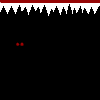As an amateur at TASing, I wanted to find a game that was pretty easy to TAS. I found a homebrew Snake game for the GBA, and decided to TAS it. This run was completed on one day in two sittings. The objective was to get the maximum score (101 points) as fast as possible.
- Note: The Snake game is Snake 1.0 by Bay Path Nintendo Club. **
Snake is a classic game in which you maneuver a snake so as to eat pellets (in this version, cherries). Each time you eat a pellet, your score goes up, but running into the snake or the wall will result in death. Also, the snake grows longer with every pellet eaten.
Helpful stats/links:
Emulator: BizHawk 1.12.2
Making of the movie:
Some of my struggles in this movie were when I would trap myself and would have to go back and forth in order to get the end of the snake out of my way. Some of the cherries also would spawn in areas that were already surrounded by the snake, meaning more quick maneuvers. The TAS overall, however, was relatively easy - mostly because of the simple controls (up, down, left, right).
Noxxa: I'm rejecting this run for two reasons. First off, it's significantly improvable, as TheRealThingy has
shown in the discussion topic.
The second reason is going to be the game choice itself. As a homebrew, it needs to stand out or make itself notable in some way. This particular homebrew happens to have a YouTube tool-assisted video with a few million views...but that's really just it. The game is just Snake, its graphics are simplistic, it has no sound effects, the only audio is a low-quality music track that's borderline painful to listen to, and the gameplay is really just Snake in its most basic form. Flat rectangular layout, no difficulty levels, no speed increase, no bonuses, no anything that makes this game stand out from any other Snake clone ever made. It really has nothing to make it stand out as a homebrew game. As such, rejecting.
CoolHandMike: Updating Rejection reason from Game Choice to Optimization. Game Choice rules now for homebrews and more lax so not exactly sure where it would fall in regards to that now. However, poor optimization rules still apply (and probably always will).



